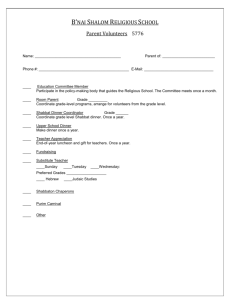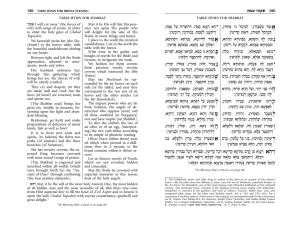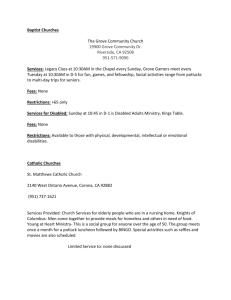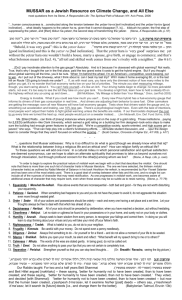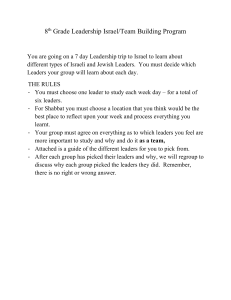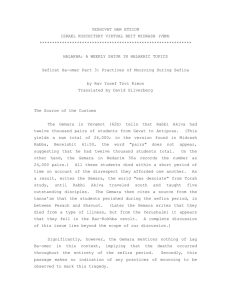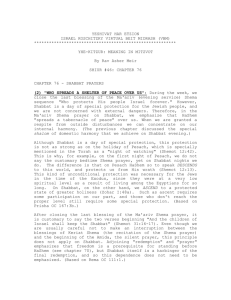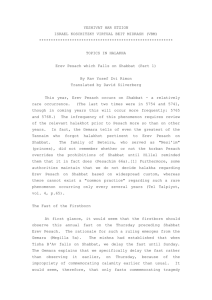What is the law in the case of a “safek p`sik reisha”, i
advertisement
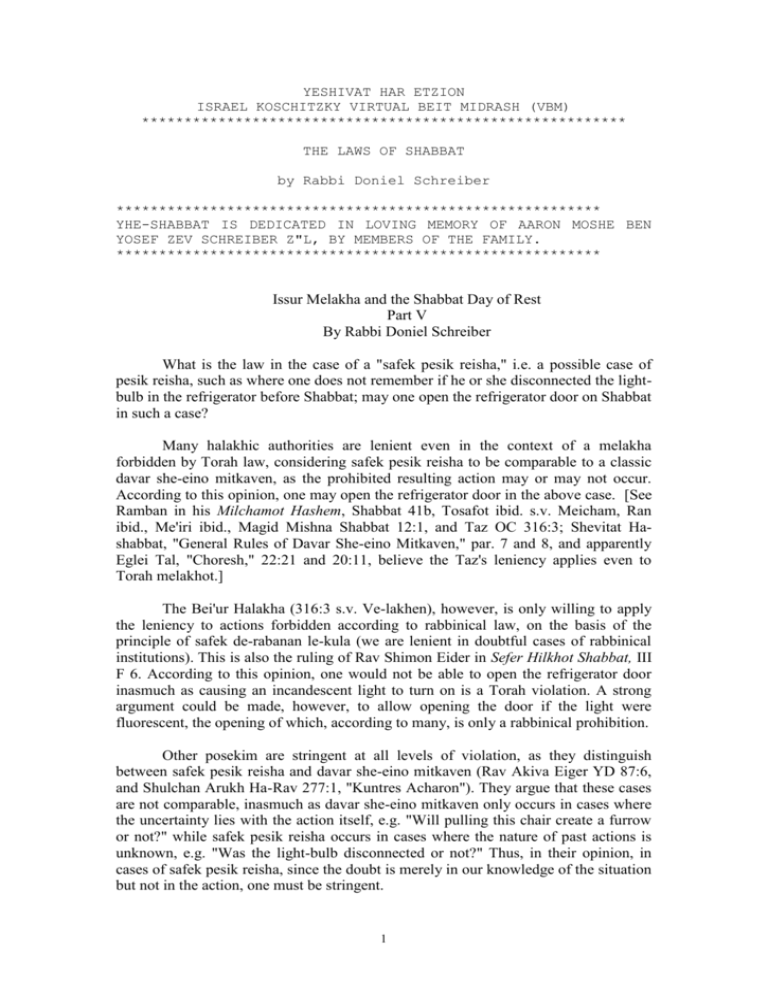
YESHIVAT HAR ETZION ISRAEL KOSCHITZKY VIRTUAL BEIT MIDRASH (VBM) ********************************************************* THE LAWS OF SHABBAT by Rabbi Doniel Schreiber ********************************************************* YHE-SHABBAT IS DEDICATED IN LOVING MEMORY OF AARON MOSHE BEN YOSEF ZEV SCHREIBER Z"L, BY MEMBERS OF THE FAMILY. ********************************************************* Issur Melakha and the Shabbat Day of Rest Part V By Rabbi Doniel Schreiber What is the law in the case of a "safek pesik reisha," i.e. a possible case of pesik reisha, such as where one does not remember if he or she disconnected the lightbulb in the refrigerator before Shabbat; may one open the refrigerator door on Shabbat in such a case? Many halakhic authorities are lenient even in the context of a melakha forbidden by Torah law, considering safek pesik reisha to be comparable to a classic davar she-eino mitkaven, as the prohibited resulting action may or may not occur. According to this opinion, one may open the refrigerator door in the above case. [See Ramban in his Milchamot Hashem, Shabbat 41b, Tosafot ibid. s.v. Meicham, Ran ibid., Me'iri ibid., Magid Mishna Shabbat 12:1, and Taz OC 316:3; Shevitat Hashabbat, "General Rules of Davar She-eino Mitkaven," par. 7 and 8, and apparently Eglei Tal, "Choresh," 22:21 and 20:11, believe the Taz's leniency applies even to Torah melakhot.] The Bei'ur Halakha (316:3 s.v. Ve-lakhen), however, is only willing to apply the leniency to actions forbidden according to rabbinical law, on the basis of the principle of safek de-rabanan le-kula (we are lenient in doubtful cases of rabbinical institutions). This is also the ruling of Rav Shimon Eider in Sefer Hilkhot Shabbat, III F 6. According to this opinion, one would not be able to open the refrigerator door inasmuch as causing an incandescent light to turn on is a Torah violation. A strong argument could be made, however, to allow opening the door if the light were fluorescent, the opening of which, according to many, is only a rabbinical prohibition. Other posekim are stringent at all levels of violation, as they distinguish between safek pesik reisha and davar she-eino mitkaven (Rav Akiva Eiger YD 87:6, and Shulchan Arukh Ha-Rav 277:1, "Kuntres Acharon"). They argue that these cases are not comparable, inasmuch as davar she-eino mitkaven only occurs in cases where the uncertainty lies with the action itself, e.g. "Will pulling this chair create a furrow or not?" while safek pesik reisha occurs in cases where the nature of past actions is unknown, e.g. "Was the light-bulb disconnected or not?" Thus, in their opinion, in cases of safek pesik reisha, since the doubt is merely in our knowledge of the situation but not in the action, one must be stringent. 1 We have discussed until now the case of pesik reisha. We must now ask: is there a difference between "pesik reisha" and "karov le-pesik reisha" (an action which will almost certainly yield a forbidden act)? According to the vast majority of posekim the answer is no, and in both cases it is forbidden. Thus, it is forbidden to open a door opposite a candle when the wind will almost certainly extinguish the flame. See Shabbat 120b; Yerei'im, no. 102; OC 277:1; Bei'ur Halakha 277:1 s.v. Shema; and Sha'ar Ha-tziyun 320:49. For further research: See Rambam Shabbat 1:6, Tosafot Shabbat 101a, Rashba Ketubot 5b, and Ritva ibid., who state that wherever it is possible that the act will not yield a prohibited act, even if only as a result of unlikely circumstances, it is not considered to be a pesik reisha. This is not a contradiction to the above halakhic ruling that karov le-pesik reisha is considered pesik reisha. The Rivash (no. 394) explains that one must distinguish between situations where although the prohibited act will probably occur, it is reasonable that the prohibited act may not happen, even if due to something unlikely, which is not considered pesik reisha; and where it almost certainly will occur, and it is unreasonable for it not to happen, which is considered a pesik reisha. In other words, is the likelihood that a violation will result considered to be beyond a reasonable doubt or not? What is the law in the case of a pesik reisha occurring through the medium of gerama (indirect forces)? For instance, if one spills water in a private domain without intending that it should travel anywhere else, and due to the laws of gravity (and not due to the force of the spill), it flows into a public domain, has one violated the prohibition of hotza'a (transporting from a private to a public domain); or if it flows onto the grass, has one violated the prohibition of zeri'a (planting and enhancing plant growth)? Does the fact that this pesik reisha (unintended certain occurrence) was caused by indirect forces (gravity) provide grounds for leniency? It appears that posekim are lenient in such cases based on the mishna in Eruvin 88a, and Rashi ibid. s.v. Shofekhin. Rav Moshe Feinstein zt"l is quoted as being lenient in this case, since it is merely a pesik reisha caused by gerama (Rav Shimon Eider, Sefer Hilkhot Shabbat, V C 5, note 36), and Rav Shelomo Zalman Auerbach zt"l (Sefer Minchat Shelomo, no. 10, letter 6) appears similarly lenient in suggesting this rationale, amongst others, for permitting the opening of refrigerators on Shabbat even when it will indirectly lead to the turning on of the compressor. We will discuss the opening of refrigerators in a later shiur. What is law with regard to causing a pesik reisha to occur through a non-Jew? Although in general one is prohibited from asking a non-Jew to perform melakha for a Jew ("amira le-nochri" – these laws will be discussed in a later shiur), one is generally permitted to ask a non-Jew to perform a permissible act which will definitely yield a secondary prohibited act, i.e. a pesik reisha (Rema OC 253:5; Magen Avraham 253:41, 277:7 and 314:5; MB 253:99; Sha'ar Ha-tziyun ibid. note 104). The reason for this leniency is that the non-Jew is not considered to be acting as an agent to perform a prohibited act, but is rather being directed to perform the primary, permitted act (Shulchan Arukh Ha-rav 253:10). 2 Therefore, where one cannot open a refrigerator on Shabbat because doing so will turn on the light inside, one may ask a non-Jew to open the door, even though this will definitely yield a melakha. (Turning on an incandescent light is generally considered to be a violation of the melakha of mavir, creating a fire). See Igerot Moshe OC, vol. 2, no. 68. Other similar questions regarding refrigerators will be discussed in a later shiur. Similarly, one may ask a non-Jew to remove an item, such as a book or glasses, from one's car, provided there is an eruv, even though this inevitably cause the lights to go on in the car. (Other similar questions with regard to amira le-nochri will be discussed in a later shiur.) Before concluding the topic of davar she-eino mitkaven, it is important to understand how it is different from a melakha she-eina tzericha le-gufa, which we discussed previously, since various configurations of davar she-eino mitkaven, in particular, combined with other factors, may yield leniencies, as described earlier. To put the question into other terms, how is the permitted act of unintentionally creating a furrow by dragging a light bench from the sun to the shade (a case which is not "pesik reisha") different than the rabbinically forbidden act of digging a hole in order to use the sand to fill up sandbags? The answer is that in the latter case one actually intends to perform the action of the melakha (i.e. creating a cavity in the ground), although not for the melakha's purpose (i.e. to improve the ground for planting), while in the former case one does not even intend to perform the action of the melakha (i.e. plowing). See Kesef Mishna Shabbat 1:7. This distinction, however does not apply in a case of davar she-eino mitkaven when it is pesik reisha de-nicha lei (an act which inevitably will lead to a melakha that one will derive benefit from), such as dragging a heavy plow over a fertile field to bring it into a shed, which is prohibited according to Torah law. This case is treated more stringently than a melakha she-eina tzericha le-gufa since it is considered to involve not only intent (Tosefot Shabbat 42a s.v. Afilu and Yoma 34b s.v. Hani mili) or awareness (Rabbeinu Chananel Shabbat 133a) to perform the action of the melakha, but even the intent to achieve the melakha's purpose as well, i.e. improving the ground for planting. How do we view, though, a case of pesik reisha de-lo nicha lei (i.e. the resultant melakha will yield no benefit), which is forbidden only rabbinically; is it different than a melakha she-eina tzericha le-gufa? Some posekim understand that in fact a pesik reisha de-lo nicha lei is precisely a melakha she-eina tzericha le-gufa, i.e. an intended action for a purpose other than that found in the Mishkan (Tosafot Shabbat 42a. s.v. Afilu). Others, though, distinguish between them (Arukh in Tosafot Ketubot 6a s.v. Hai), considering pesik reisha de-lo nicha lei to be an unintended act. See Derush Ve-chiddush Rav Akiva Eiger, essay 10, no. 8. The next shiur will address the laws of mitasek, one who commits an inadvertent melakha, such as unintentionally turning on a light on Shabbat. 3

